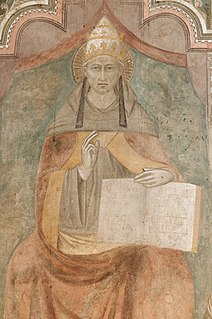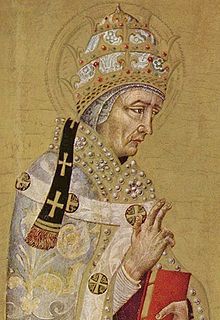
Baldassarre Cossa was Pisan antipope John XXIII (1410–1415) during the Western Schism. The Catholic Church regards him as an antipope, as he opposed Pope Gregory XII whom the Catholic Church now recognizes as the rightful successor of Saint Peter.
Pope Benedict VIII was the bishop of Rome and ruler of the Papal States from 18 May 1012 until his death. He was born Theophylact to the noble family of the counts of Tusculum. Unusually for a medieval pope, he had strong authority both in Rome and abroad.
Pope Benedict IX, born Theophylactus of Tusculum in Rome, was bishop of Rome and ruler of the Papal States on three occasions between October 1032 and July 1048. Aged approximately 20 at his first election, he is one of the youngest popes in history. He is the only man to have been Pope on more than one occasion and the only man ever to have sold the papacy.

Pope Celestine V, born Pietro Angelerio, also known as Pietro da Morrone, Peter of Morrone, and Peter Celestine, was head of the Catholic Church and ruler of the Papal States for five months from 5 July to 13 December 1294, when he resigned. He was also a monk and hermit who founded the order of the Celestines as a branch of the Benedictine order.
Pope Gregory V, born Bruno of Carinthia, was the bishop of Rome and ruler of the Papal States from 3 May 996 to his death. A member of the Salian dynasty, he was made pope by his cousin Emperor Otto III.
Pope Gregory VI, born Giovanni Graziano in Rome, was bishop of Rome and ruler of the Papal States from 1 May 1045 until his abdication at the Council of Sutri on 20 December 1046.

Pope Gregory XII, born Angelo Corraro, Corario, or Correr, was the Roman claimant to the headship of the Catholic Church from 30 November 1406 to 4 July 1415. Reigning during the Western Schism, he was opposed by the Avignon pope Benedict XIII and the Pisan popes Alexander V and John XXIII. Gregory XII wanted to unify the Church and voluntarily abdicated in 1415 to end the Schism.
Pope Leo V was the bishop of Rome and nominal ruler of the Papal States from July 903 to his death in February 904. He was pope during the period known as the Saeculum obscurum, when popes wielded little temporal authority.

The Avignon Papacy, also known as the Babylonian Captivity, was the period from 1309 to 1376 during which seven successive popes resided in Avignon rather than in Rome. The situation arose from the conflict between the papacy and the French crown, culminating in the death of Pope Boniface VIII after his arrest and maltreatment by Philip IV of France. Following the further death of Pope Benedict XI, Philip forced a deadlocked conclave to elect the French Clement V as pope in 1305. Clement refused to move to Rome, and in 1309 he moved his court to the papal enclave at Avignon, where it remained for the next 67 years. This absence from Rome is sometimes referred to as the "Babylonian captivity of the Papacy".

Doctor of the Church, also referred to as Doctor of the Universal Church, is a title given by the Catholic Church to saints recognized as having made a significant contribution to theology or doctrine through their research, study, or writing.

The Western Schism, also known as the Papal Schism, the Vatican Standoff, the Great Occidental Schism, or the Schism of 1378, was a split within the Catholic Church lasting from 1378 to 1417 in which bishops residing in Rome and Avignon both claimed to be the true pope, and were joined by a third line of Pisan popes in 1409. The schism was driven by personalities and political allegiances, with the Avignon papacy being closely associated with the French monarchy. These rival claims to the papal throne damaged the prestige of the office.

Saeculum obscurum, was a period in the history of the Papacy during the first two-thirds of the 10th century, beginning with the installation of Pope Sergius III in 904 and lasting for sixty years until the death of Pope John XII in 964. During this period, the popes were influenced strongly by a powerful and allegedly corrupt aristocratic family, the Theophylacti, and their relatives and allies. The era is seen as one of the lowest points of the history of the Papal office.

A papal conclave is a gathering of the College of Cardinals convened to elect a bishop of Rome, also known as the pope. The pope is considered by Catholics to be the apostolic successor of Saint Peter and earthly head of the Catholic Church.
A papal renunciation occurs when the reigning pope of the Catholic Church voluntarily steps down from his position. As the reign of the pope has conventionally been from election until death, papal renunciation is an uncommon event. Before the 21st century, only five popes unambiguously resigned with historical certainty, all between the 10th and 15th centuries. Additionally, there are disputed claims of four popes having resigned, dating from the 3rd to the 11th centuries; a fifth disputed case may have involved an antipope.

Pedro Martínez de Luna y Pérez de Gotor, known as el Papa Luna in Spanish and Pope Luna in English, was an Aragonese nobleman, who as Benedict XIII, is considered an antipope by the Catholic Church.

The Council of Sutri was called by the Holy Roman Emperor Henry III and opened on December 20, 1046, in the hilltown of Sutri, at the edge of the Duchy of Rome. The Catholic Church does not list this as an ecumenical council.

The history of the papacy, the office held by the pope as head of the Catholic Church, according to Catholic doctrine, spans from the time of Peter to the present day. Moreover, many of the bishops of Rome in the first three centuries of the Christian era are obscure figures. Most of Peter's successors in the first three centuries following his life suffered martyrdom along with members of their flock in periods of persecution, and they had supreme hierarchy to be passed on within the church.

The selection of the pope, the bishop of Rome and supreme pontiff of the Roman Catholic Church, prior to the promulgation of In nomine Domini in 1059 varied throughout history. Popes were often appointed by their predecessors or by political rulers. While some kind of election often characterized the procedure, an election that included meaningful participation of the laity was rare, especially as the popes' claims to temporal power solidified into the Papal States. The practice of papal appointment during this period would later result in the jus exclusivae, i.e., a right to veto the selection that Catholic monarchs exercised into the twentieth century.

The Tusculan Papacy was a period of papal history from 1012 to 1048 where three successive relatives of the counts of Tusculum were installed as pope.

The resignation of Pope Benedict XVI took effect on 28 February 2013 at 20:00 CET, having been announced by him on 11 February. Benedict XVI's decision to step down as leader of the Catholic Church made him the first pope to relinquish the office since Gregory XII in 1415 and the first to do so on his own initiative since Celestine V in 1294.















